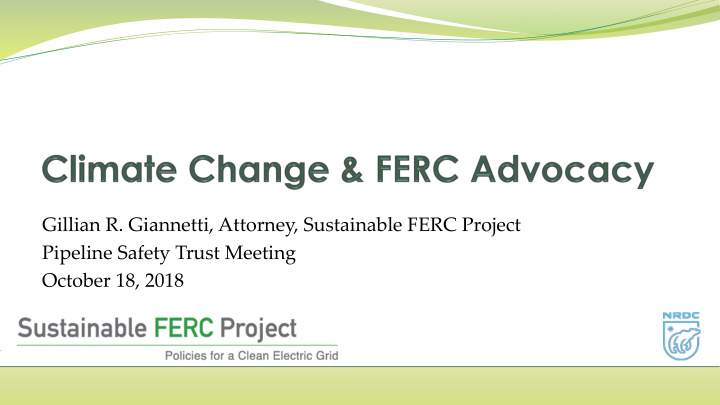



Gillian R. Giannetti, Attorney, Sustainable FERC Project Pipeline Safety Trust Meeting October 18, 2018
The Sustainable FERC Project Founded in 1996 Based at Natural Resources Defense Council Broad coalition working to establish a clean grid The Project advocates at FERC, DOE, RTOs, and ISOs
Sabal Trail: A Critical Shift Pre- Sabal Trail FERC required to consider direct and indirect effects under NEPA FERC did not consider upstream and downstream GHGs to be indirect effects But, FERC still disclosed estimated emissions Saba l Trail Major interstate gas pipeline project along the Southeast to serve Florida power plants FERC said that downstream GHGs were not indirect effects; D.C. Circuit disagreed Post -Sabal Trail FERC on rehearing for Sabal Trail New Markets Expansion order
FERC Policy Statement Review Debuted in 1999 November 2017: Report by Dr. Susan Tierney Natural Gas Pipeline Certification: Policy Considerations for a Changing Industry December 2017: Chairman McIntyre’s announcement April 2018: Notice of Inquiry broken into four topics Pipeline Need, Eminent Domain, Environmental Impacts, and FERC’s Efficiency
FERC Policy Statement Review Pipeline Need: An “all relevant factors” approach This includes consideration of environmental/climate impacts Overreliance on precedent agreements Eminent Domain: Require receipt of all federally mandated permits Unnecessary environmental and economic damage Constitution Pipeline
FERC Policy Statement Review Environmental Impacts: Consider all environmental impacts This includes upstream and downstream emissions Attempt to disclose as much as possible FERC’s Efficiency: Prioritize “getting it right” over “getting it done”
Limitations on Public Engagement Issues with FERC’s accessibility Use of “public” hearings FERC’s informational materials FERC’s website Lack of Office of Public Participation
The Public Voice “The first contact I received from FERC was in 2014. It was a glossy brochure about the proposed pipeline that outlines how the gas company is going to come to your home to discuss the route through your land and implied that if you did not negotiate an easement with them, eminent domain would be invoked. Though this was literally years before a Certificate of Public Convenience and Necessity had been granted, it presented the project as if it was already a ‘done deal.’ It was not helpful because we had to do a lot of work and research on our own to feel like we could have a say in the process. I spent a lot of time working through the FERC website, which was also not particularly helpful. The site was hard to navigate and often does not work at night or in the evening. Further, it frequently gave misleading error messages that implied that I was unauthorized to view the document in question rather than merely that the site was down and that the document would be available for citizen review if I tried again the next day. I would sit there attempting to read through and understand thousands of documents and no one at FERC was available to help with that process. The site feels unfriendly to the casual landowner who is trying to learn something and utilize FERC resources. Based on this experience, it seems to me that citizen engagement is inconvenient for FERC, and so they avoid or ignore it.” – Affidavit of Joyce Burton, Afton, Virginia (Atlantic Coast)
The Public Voice “And it just feels like whatever we say, it means nothing. I have … called FERC a number of times, both the office responsible for our area and the main office in Washington, D.C.…. At first I asked about moving [the route], and the woman I spoke to told me to send them a picture of where the route was, because ‘we tell them where to put the line, they do not tell us.’ But then she proceeds to tell me that if FERC wants to they can put it a foot away from our house, and it just felt like I was talking to the pipeline people, because the interaction was so cold, and so awful. Then the woman at FERC says, ‘We here in D.C. should be more worried than you, because here we have pipelines running under the city that are 100 years old.’ That just felt like such a selfish, heartless response. So I was not real happy with the people in D.C.” – Affidavit of Susan Pantalone, Elysburg, Pennsylvania (Atlantic Sunrise)
Gillian R. Giannetti Attorney, Sustainable FERC Project Natural Resources Defense Council 1152 15 th Street, NW, Suite 300 Washington, DC 20005 Ph: 202.717.8350 email: ggiannetti@nrdc.org
Recommend
More recommend